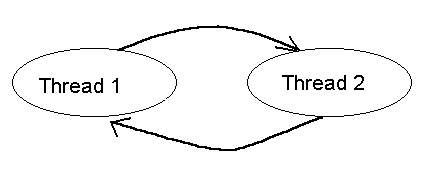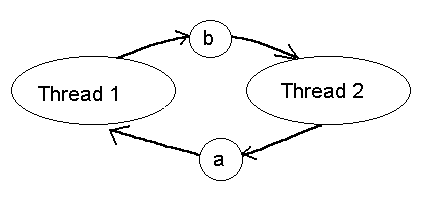
Example: Suppose we have the following code, and gerenerate 2 threads each waiting on data from the other one:
class Foo{
}
Now lets use the class as follows: Foo a = new Foo(); Foo b = new Foo(); a.setMaximum(2,b); b.setMaximum(3,a); This can cause the following execution:
*wait was invoked by the JVM switching which is the current thread of a set of equal priority threads.
|
||||||||||||||
Avoiding DeadlockYou can avoid problems like the example above by making sure that synchronized methods never call (directly or indirectly) synchronized methods on other objects (that could be locked by other threads). |
